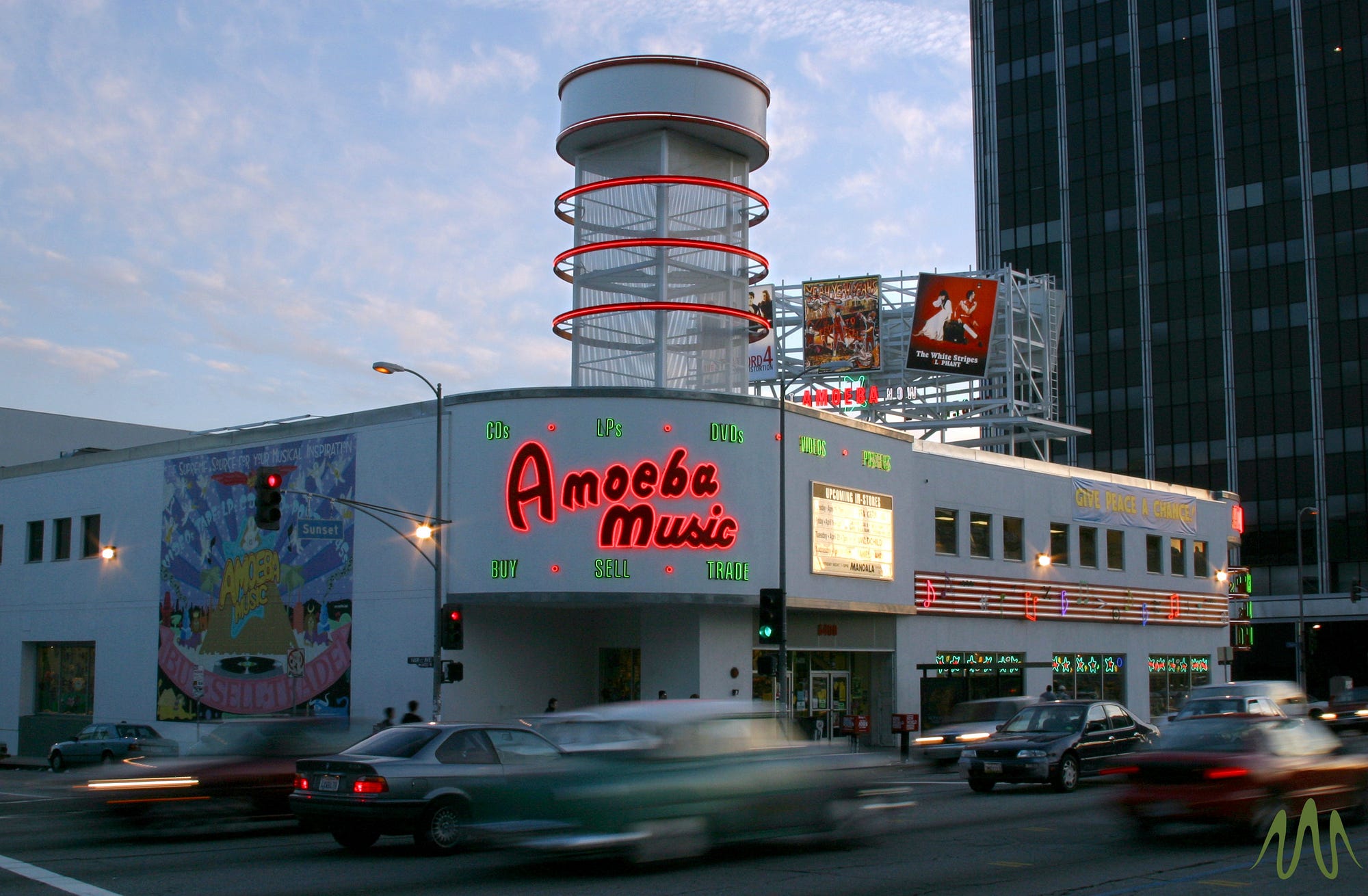By Marc Weingarten
July 8, 2018

Amoeba Music, Sunset Blvd.
Amoeba Music announced last month that it is downsizing, leaving its behemoth store on Sunset Boulevard after 17 years. It’s moving to a smaller spot nearby and turning part of its reduced floor space into a marijuana dispensary. Cue the laments of collectors who spent their rent money there on 180-gram vinyl.
Few, I suspect, will get too melancholy about the CDs they bought at the store. Amoeba’s bottomless compact disc inventory, once a glorious spectacle, now feels like the contents of an ancient reliquary. It’s as if Best Buy filled most of its store space with Sony Walkmen.
CDs have become music’s bastard stepchildren: unwanted, unloved and misunderstood. The stereos in new cars can’t even play them. Cassette tapes, oddly, now cast a warm nostalgic glow alongside vinyl.
The problem with sundowning music formats is that, in our eagerness to pitch ourselves into the future with new technology, we bury what brought us so much pleasure in the first place. CDs sound better than streaming files. They last longer than cassettes. And yet they have become irrelevant.
Pity the CD. Has any format ever been more disparaged? For vinyl purists, compact discs have a lot to answer for, mainly because they ushered in the era of digital recording in the early ’80s. For audiophiles, digital, with its claims of perfect sound forever, was the enemy; it turned music brittle and distorted sound the way VHS tape degraded color. Of course our current popular format, streaming files, have a higher compression rate than compact discs, which is a fancy way of saying that even your old CD copy of “Three Feet High and Rising” will sound better than anything you might listen to on Spotify. So does every classical CD recorded after 1984.
Compact discs felt like science fiction in the era before personal computers, a portent of how technology would change our lives for the better: Lasers made it play! There were 72 minutes to a disc, and you didn’t have to turn it over! Sure, CDs were initially overpriced, and in the rush to convert old recordings there were master tapes transferred at the wrong speed, noisy imperfections, xeroxed liner notes.
But compact discs eventually hit their stride, as independent labels mastered the art of packaging, so that CDs from Sub Pop or Matador carried with them the cachet of our precious vinyl. Nirvana’s “Nevermind” isn’t technically a “classic album” but a classic CD; so are Outkast’s “Stankonia,” Radiohead’s “Kid A” and Jay-Z’s “The Blueprint.”
CDs have also given us other gifts. Without the technological advances brought on by compact discs, Beach Boys’ leader Brian Wilson might not have bothered to dig through his vault. But with digital’s help, he carefully pieced together 2004’s “Smile,” resurrecting rock’s infamous “lost album,” which, incidentally, sounded great on CD.
Compact discs also nudged the record industry to exhume and curate our musical past. There now exists a vast and essential digital archive of every conceivable strand of music in lavish box sets with copious liner notes. (They’re cheap too.) Because of this CD-driven development, a fan can wrap his arms around an entire artist’s oeuvre without having to spend a small fortune on rare vinyl.
Consider that the biggest-selling CD box set remains Columbia Records’ 1990 reissue of Delta blues genius Robert Johnson’s recordings — a landmark moment that moved this cornerstone artist into the 20th century mainstream. Streaming services such as Spotify also carry the Johnson collection (of course without any of the recording information or historical context available in the liner notes) but it’s only available to them because someone assembled it for the CD. It’s fine, but there’s no fun in it.
Rather than mourn Amoeba’s contraction, it might be a good moment to acknowledge that the compact disc had more impact on music than we care to admit, and that it can still provide us with pleasure even now. Everyone who ever patronized Amoeba should take one good, long, last look. You will never see that many CDs in one place again.
Marc Weingarten is the author of "Thirsty: William Mulholland, California Water and the Real Chinatown."
No comments:
Post a Comment